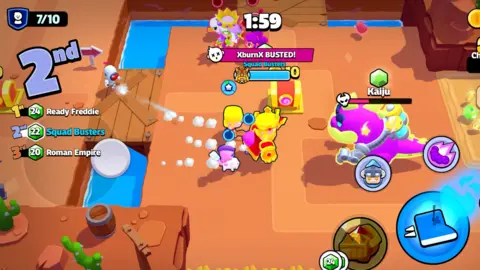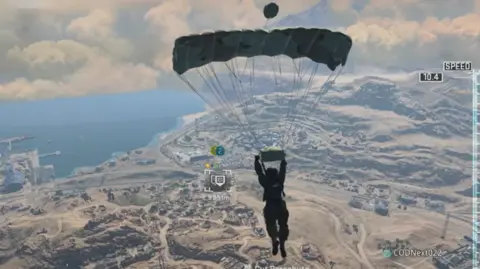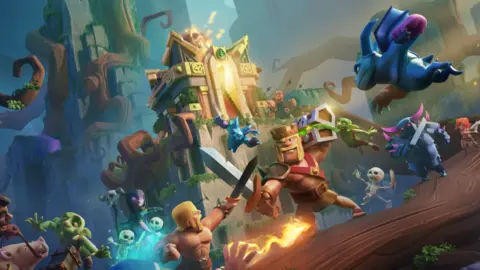Technology of Business Editor
 Supercell
SupercellFor someone pushing his company to break new ground, Ilkka Paananen appears relaxed.
Not wearing shoes, like everyone else in the office – it’s a Finnish thing I’m told – he tells me the mobile gaming industry needs shaking up.
“We need to take bigger risks,” says Mr Paananen the chief executive of Finland’s Supercell – a giant in the world of mobile games.
“We have to create new kinds of game experiences,” he says.
The company already has some of the most successful mobile games ever released; last year Clash of Clans and Brawl Stars generated more than a billion dollars between them.
Nonetheless, over the past couple of years Mr Paananen has “significantly” increased investment in new games, hired more staff and set up new game studios.
“We have a lot of very, very talented, ambitious teams who are trying to reimagine what mobile games might look like in, say, 2030, and I wish I had the answer. I don’t, but you can certainly expect different types of game experiences than you’ve seen so far on mobile,” he says.
Mr Paananen underlines the need for innovation with a statistic; last year 60% of the time spent on mobile games was accounted for by games that were at least six years old, and only 10% of playing time was on titles developed in the past year.
And without exciting new games, the industry will struggle for attention.
“The competition for people’s free time is so much tougher these days. And not only are you competing against other games, but you’re competing against social media, music streaming, video streaming, etc, all available on your mobile phone,” he says.
One reason the industry is not churning out games, he says, is the expense. In the early days, mobile games were simpler and cheaper to make than games played on consoles and PCs. But not anymore.
“Building games has actually become a lot more expensive,” says Mr Paananen.
“The main reason is that the platform [smartphones] enables you to do way more today than 10 years ago. And the other thing is that the kind of a bar is just way higher in consumers’ minds.”
 supercell
supercellSupercell’s own production line has stumbled. Launched last year, Squad Busters had a strong start, but has faded since then.
“The truth is that it hasn’t met our ambition, at least not yet,” admits Mr Paananen.
In February, Supercell appointed a new general manager to Squad Busters.
“The team has made some really, really bold changes to the game. And of course, time will tell,” Mr Paananen says.
Supercell has taken a different approach with another new game, Mo.co.
The monster hunting game was launched in March, but only to those with an invite from Supercell.
“It’s hard to measure what they consider to be a success with that one… it’s still invite only and hasn’t really set the world on fire,” says Neil Long, the founder and editor of mobilegamer.biz, and who has been a video games journalist for more than 20 years.
“Mobile games are quite an extreme business, where the successes are really big, but also the failures are really, really big,” he says.
He points to last month’s decision by games maker Activision to pull a mobile version of its huge hit game, Call of Duty.
“They would have spent years developing this game, and then they launched, it didn’t work, and it’s dead within a year… that’s why people aren’t taking risks, because, you know, the failures are very visible and costly.”
He also points out that the mobile games industry has changed a lot in the years since Supercell launched its hit games.
There’s much more competition and some developers are choosing not to make a big, splashy launch, and instead tweak games on the go.
“Maybe the era of these mega launches is kind of over,” says Mr Long.
“Sometimes it’s better to put your game out there and then just sort of build it as you go and learn what players like and don’t like,” he says.
 Activision
ActivisionSupercell gives a lot of independence to the teams that are working on new games. At the moment there are 10 of them with games in various stages of development.
One of their guiding principles is to create games with longevity.
“The question that our teams ask themselves is: ‘Why would people play this game in five or 10 years?’.”
“They’d love to be in the same class of companies like, say, Nintendo, for example. It’s been around more than 100 years.”
Mr Long says at the core of Supercells’ success is a simple principle.
“They take quite complex game ideas and make them really easy and accessible to play, and sort of cartoony and fun.”
 Supercell
SupercellLike many businesses, Mr Paananen is hopeful that AI will help spur innovation. At Supercell it’s being used to create new types of games.
“I’ve seen some internal prototypes, but it’s super early. I think it’s going to take a few years for somebody to invent something completely new on that front.
“But it’s one of those things where it’s not a question of if it’s going to happen. It’s question of when it’s going to happen and who will make it happen.”
Supercell also has its AI Innovation Lab in Helsinki. It’s a chance for people external to the company to experiment with Supercell’s intellectual property, including its games and characters.
“We basically gave them a free hand to do whatever they wanted, in order to spark innovation.
Mr Paananen says it’s been a “massive success” and another is planned for San Francisco.
“The end result might not even be a game, or a game that you and I would think about as a game, but it’s completely different experience enabled by AI.”
Mr Long says AI has been useful in specific areas, like speeding up game development or analysing player behaviour.
But so far nothing revolutionary.
“In terms of creating entirely new types of games we’ve yet to see it. And it doesn’t feel like it’s about to happen just yet, but we’ll see.”







